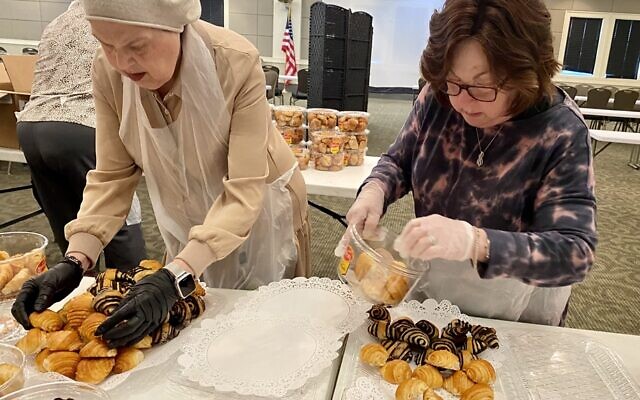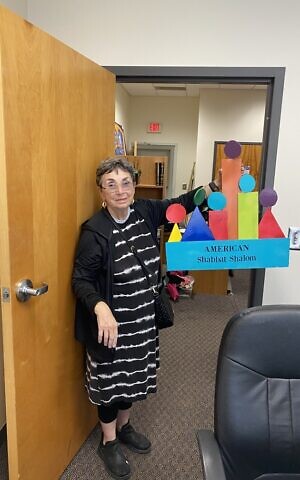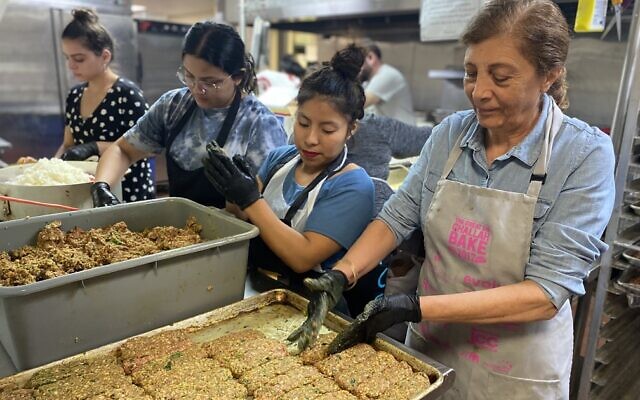The Shabbat Project: Keeping It Together
Toco Hills community participates in global program.
Chana Shapiro is an educator, writer, editor and illustrator whose work has appeared in journals, newspapers and magazines. She is a regular contributor to the AJT.
The announcement of The Shabbat Project, a communal Shabbat gathering in the Toco Hills area, was more than welcome. Obsessed with news from Israel and shaken by antisemitism here at home and abroad, Jews were eager to join other Jews for comfort and unity; Toco Hills was part of a global phenomenon.
In 2014, the idea of Jewish communities world-wide sharing one Shabbat was conceived by South Africa’s chief rabbi, Warren Goldstein, and his wife, Gina. Getting Jews from all parts of the world to participate in a Jewish event on the same Shabbat seemed overly optimistic; however, undaunted, the Goldsteins boldly launched a unifying movement, which they named The Shabbat Project, and it soon spread.
The goal of the movement was to encourage Jews from across the spectrum – religious, secular, traditional, young, and old, from every ethnic background and practice, from all parts of the world – to experience one Shabbat together. This year, The Shabbat Project, which had already become a global vehicle for “creating a Jewish future based on unity, pride, and values,” showed a dramatic increase in events and participation, in more than 1,500 cities in over 100 countries, bonding Jews everywhere who were horrified by the Oct. 7 massacre in Israel. Rabbi Goldstein remarked, “Jews worldwide are thirsting for Jewish unity and for a genuine connection, particularly now.”
This year, from sunset on Friday, Nov. 3, until the stars came out on Saturday night, Nov. 4, The Shabbat Project came to life in Toco Hills. One month after the surprise attack by Hamas, the universal Shabbat observance was dedicated to the people of Israel and was framed with the slogan, “Keeping It Together,” referencing the vernacular “keeping” Shabbat, meaning observing the Sabbath.
Using social media, flyers in supermarkets, grocery stores, businesses, and announced in the AJT Jewish Connector, the program in Toco Hills issued an open invitation, beckoning all Jews to share a communal kiddush on the grounds of Congregation Beth Jacob, where special security had been hired to ensure safety.
Dozens of volunteers prepared kiddush food and set up buffet tables in an open area outside the synagogue. Artist Judy Kessler stepped up to create 4-foot-tall centerpieces for the buffet tables, their design based on the universal symbol for
The Shabbat Project, their size large enough to be seen from a distance for visitors unfamiliar with the kiddush site. The buffet tables referenced areas of origin of Jewish residents of Toco Hills, including North America, South America, Asia, the Middle East, Israel, and Europe.
After morning services, neighborhood Toco Hills synagogues cancelled their usual synagogue kiddush. Between 11:45 a.m. to 1 p.m., congregants headed to Beth Jacob where nearly 1,000 community members gathered for camaraderie and plentiful kiddush food, comprising a diverse group observing Shabbat together.
The weekend was even more meaningful because it was a month since the Hamas massacre, likened to the 30 days of shloshim, the intense period of mourning following the death of a brother or sister, a symbolic loss many felt deeply.

Sarah Faygie Berkowitz, director of marketing and engagement of Beth Jacob, noted, “When Rabbi Mordechai Cohen began to recite Kiddush outside in a booming voice, I looked around and saw Jews of all backgrounds coming to celebrate Shabbat together. It’s a boatload of work feeding so many people, but the unity and the holiness it created made it all worth it.”
Dozens of volunteers spent many hours baking and setting up for The Shabbat Project Saturday kiddush; however, The Shabbat Project began the previous evening at a seated Friday night dinner for 600 at Torah Day School of Atlanta. For the Friday night dinner, community member David Behdadnia led several days of cooking with a coordinated volunteer team who prepared a multi-course Shabbat dinner with the menu theme, “Shabbat in Israel.” Temima High School girls created floral centerpieces for the tables and helped with the set-up. The Shabbat Project kiddush and dinner in Toco Hills involved scores of volunteers and was sponsored by more than 50 individual donors, Toco Hills businesses, and synagogues.
Rabbi Don Seeman of New Toco Shul remarked, “Besides supporting our brothers and sisters in Israel, one of our fundamental responses to the terrible events from which our community continues to reel is to reaffirm Jewish life, the values for which we live, and our attachment to one another. That is how I understood the Shabbos Project this year.”

Simultaneously, many other Atlanta synagogues, like Congregations Beth Tefillah and Kesher Torah in Sandy Springs, which joined for Shabbat events, embraced The Shabbat Project. Atlanta was one of 900 participating North American cities. An official Shabbat Project report lists 1,594 events in North America, as well as programs in cities as widespread as Tokyo, Abidjan on the Ivory Coast, and Guadeloupe in the Caribbean.
On the Nov. 3-4 Shabbat, Israelis demonstrated amazing spirit and fortitude in spite of the ongoing war. Some Shabbat events in Israel were even held in bomb shelters. The Shabbat Project reached hotels around Israel, where evacuees from Sderot and displaced families from the north and south sheltered. Throughout Israel, challahs, candles, and Shabbat food were distributed by Shabbat Project volunteers for families in which a parent had been drafted, and Shabbat meals were delivered to IDF bases.
Responding to the impact of this year’s Shabbat Project, founder Rabbi Goldstein concluded, “While a grim battle for survival rages on, we affirm our right to live as Jews, to celebrate with pride and confidence, to proclaim, Am Yisrael Chai!”




comments